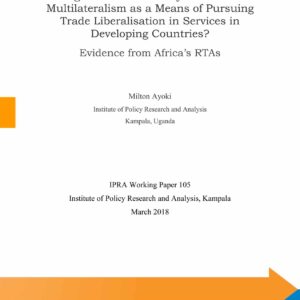$3.00
This paper examines the financial system reforms in the context of financial sector deepening, and strategy for financial sector development and inclusion in Uganda. Results suggest that the indicators of financial sector development are largely as they were in 1996 and that the actual gains from financial inclusion strategies are small. Evidence suggests a weak link between financial deepening and financial usage by firms and households. It finds the acclaimed success (by policy makers and stakeholders) in achieving financial inclusion somewhat exaggerated because their assessment relies in large part on the number of financial and mobile money accounts. The paper concludes that measurement of financial inclusion needs to go beyond looking at account numbers to understanding what is done with those accounts. It also recommends the subordination of financial inclusion policy to the needs of firms and households (—the type that is modelled to fit the local context) and more consideration of behavioural constraints in financial inclusion programmes.







There are no reviews yet.